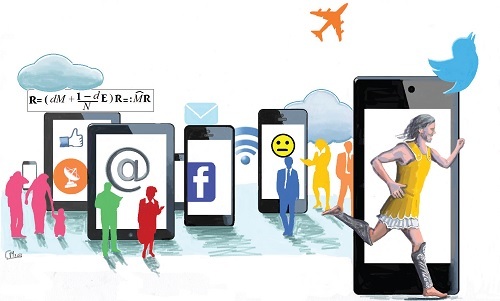The world has seen more than one industrial revolution and another one is already upon us. We should face it as optimists.
According to the classical legend, a Greek messenger named Pheidippides ran from Marathon to Athens to deliver a message. It took him 36 hours. A horse-drawn carriage or a modern car would have saved Pheidippides considerable time. This is called evolution. But today his message would have been tweeted in a second. One second versus 36 hours: that is a revolution! And such revolutions have the potential to change the entire landscape.
Take the Industrial Revolution, which spanned a century from the mid-1700s, marking the transition from muscle to mechanical power. It was a major turning point in history and affected every aspect of daily life. It led to the expansion of our cities, as productivity growth in agriculture released labour to work in factories instead.
But by the late 1800s cities had become polluted and unhealthy, making them miserable places to live and work. Logistics in those times relied on horses. Growing cities were running out of space for fodder and streets were drowning in manure. What was needed was a revolution that would change basically everything.
A second industrial revolution swept in, bringing with it the internal combustion engine, electricity, the factory assembly line and more. The crisis was relieved, horses were displaced from our urban streets, and again almost every aspect of human life felt the impact.
But it did not stop there: in the 1960s and 1970s a third industrial revolution took hold-a digital revolution-brought about by the development of semiconductors, mainframes, personal computing and, in the 1990s, the Internet.
This potted history should be food for thought as we contemplate our current environmental challenges-climate change, biodiversity, pollution and waste. True, carbon pricing may help, and cleaner processes are good for the environment. But the solution to, say, climate change, will eventually require a revolution. Perhaps someone will come up with a technology that vacuums excess CO2 from the atmosphere and plants it back in the soil. Or perhaps we will learn how to harness all the energy we need from the sun or from the jet streams in the upper atmosphere, opening the way to a smooth energy transition. Or perhaps more radical changes to lifestyles and ways of doing business will be forced upon us.
We can face the future as optimists or pessimists. A pessimist sees climate policies, for instance, as a threat to old ways of doing business and conducting life, and demands protection from changes, just like the former industrial champions in the past. An optimist sees opportunities for enhancing the quality of life and safeguarding our future. And a wise policy maker sees the need for frameworks that smooth the transition.
But whether one is optimistic or pessimistic, or feels prepared or not, a revolution is inevitable. And indeed, the fourth industrial revolution appears to be upon us. With the advent of 5G mobile Internet, smaller and more powerful sensors, artificial intelligence and machine learning, this revolution will be as transformational, if not more so, as anything mankind has experienced before. It will change the way we live, work and relate to each other. Artificial intelligence, robotics, the Internet of Things, 3D printing, nanotechnology, biotechnology, renewable energy, and quantum computing: such advances are transforming the world faster than we realise. Occupations which only a few short years ago appeared safe bets, such as those of bus drivers and lorry drivers, may soon go the way of the horse, thanks to artificial intelligence now being applied to self-driving vehicles.
Just like previous revolutions, this revolution is starting to disrupt business. It is changing the way we design, manufacture, transport, promote and consume goods and services. Instead of reading this article in a glossy magazine, you may well be browsing it on your smartphone or tablet. This opens up opportunities, but has costs: in my country, Finland, paper mills have had to close down. Meanwhile, digital technology has redefined ownership and spurred new forms of capitalism: Facebook does not produce content, Uber does not own taxis and Airbnb does not own real estate. What they do own is intellectual capital and creativity, which are harbingers of new wealth. Similarly, Amazon, eBay and PayPal have changed the retail landscape forever. And this is just the beginning.
Do you remember life before the smartphone? My kids don't. Their kids will probably not remember what it was like before 3D printers produced their new sneakers, or before self-driving electric cars took them to school, or before all money was electronic. The fourth industrial revolution will also change the way we work. Some studies estimate that by 2030, half of today's jobs in advanced economies will be taken over by machines. This will have far-reaching economic, political, and social implications. The fruits of the fourth industrial revolution might be reaped by those who can work with smart machines and draw added value from artificial intelligence. We will have to work smarter, not harder. The smartest digital natives might feel at home, but those with only basic skills could suffer.
As ever with such revolutions, there will be creative destruction. Much will depend on how we manage this huge change. There will be moral and ethical issues to address, concerning the likes of nanotechnology, gene manipulation in medicine and even robot soldiers. The pessimists will try to hit the brakes and revert back to the old ways. The optimists will embrace change by looking for solutions. Policy makers must look for frameworks that can help smooth transitions. Not even the best regulators can predict what will eventually work and what will not. But they will know from previous transitions that it is better to facilitate flexible product, capital and labour markets than to protect former, but alas outmoded, champions. Revolutions are about renewal, and for that, market experimentation is key.
As this revolution alters the landscape faster than ever, we need to dig deeper into what it means for our societies. The OECD, which is a global hub of knowledge and analysis, brings together people and research from different fields: it is the perfect forum for this kind of reflection. The main themes of the 2016 OECD Forum and Ministerial Council Meeting-productive economies, future societies, inclusiveness, sustainability-pinpoint the major challenges we face today. New economic phenomena require new concepts and common approaches to enable analytical work and policy formation, while co-operation and peer pressure among like-minded countries is key to making progress together. The OECD has much to offer in helping policy makers plot the most effective ways forward.
This is important, for the more technology advances, the more emotional intelligence and empathy come to the fore. As we address the new and rapidly evolving challenges of the fourth industrial revolution, it is wise to remember that every challenge is an opportunity. We cannot allow ourselves to become too realistic or to close our minds to future possibilities. Why? Because the only limiting factor behind this revolution is our imagination.
Welcome to the future.
This post is part of a series produced by The Huffington Post and the OECD, in conjunction with the OECD Forum (Paris, May 31-June 1). The OECD Forum is a major international conference, held at the OECD headquarters in Paris, where policies and ideas are shared between governments, business, civil society and academia. This article first appeared in the OECD Yearbook. For more information on the Forum, visit www.oecd.org/forum.

